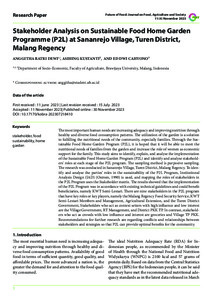| dcterms.abstract | The most important human needs are increasing adequacy and improving nutrition through healthy and diverse food consumption patterns. The utilization of the garden is a solution to fulfilling the nutritional needs of the community, especially families. Through the Sustainable Food Home Garden Program (P2L), it is hoped that it will be able to meet the nutritional needs of families from the garden and increase the role of women as economic support for the family. This study aims to identify, explain, and analyse the implementation of the Sustainable Food Home Garden Program (P2L) and identify and analyse stakeholders' roles at each stage of the P2L program. The sampling method is purposive sampling. The research was conducted in Sananrejo Village, Turen District, Malang Regency. To identify and analyse the parties’ roles in the sustainability of the P2L Program, Institutional Analysis Design (IAD) (Ostrom, 1990) is used, and mapping the roles of stakeholders in the P2L Program uses the Stakeholder matrix. The results showed that the implementation of the P2L Program was in accordance with existing technical guidelines and could benefit beneficiaries, namely KWT Semi-Lestari. There are nine stakeholders in the P2L program that have key roles or key players, namely the Malang Regency Food Security Service, KWT Semi-Lestari Members and Management, Agricultural Extension, and the Turen District Government, Stakeholders who act as context setters with high influence and low interest are the Village Government, RT Management, and District PKK TP. In contrast, stakeholders who act as crowds with low influence and interest are groceries and Village TP PKK. Recommendations for further research are regarding conflicts and relationships between stakeholders and strategies so that P2L can provide optimal benefits for the community. | eng |


